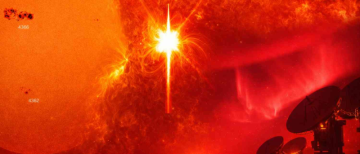There are several issues brought on by variations in the Earth's magnetic field, including compass readings that do not display true north and interference with satellite operations.
According to recent work by geophysicists at the University of Leeds, understanding the reasons for the peculiarities, or anomalies, of the Earth's magnetic field, depends on how this super-hot core is cooled.
The core of the Earth is made up of a mass of swirling, molten iron that functions as a dynamo at the extraordinarily high temperatures found there. The Earth's magnetic field is generated by the movement of molten iron. This cooling process does not occur uniformly over the Earth, according to research by Dr. Jonathan Mound and Professor Christopher Davies from Leeds' School of Earth and Environment. These changes lead to anomalies in the Earth's magnetic field.
According to seismic studies, the mantle contains some especially hot zones, such as those beneath Africa and the Pacific. According to computer models performed by the researchers, these hot zones lessen the core's ability to cool, which modifies the magnetic field's characteristics locally or regionally.
For instance, the magnetic field at the top of the core is anticipated to be weaker where the mantle is hotter.
Moreover, this causes a weaker magnetic field to be projected into space above the South Atlantic, which disrupts satellites in orbit.
© Vygr Media Private Limited 2022. All Rights Reserved.

























